 W
WAnastasios Charalambis was a Greek Lieutenant General and interim Prime Minister of Greece for one day in 1922.
 W
WAristeidis Chasapidis was a Hellenic Army officer who reached the rank of lieutenant general and served as Chief of the Hellenic Army General Staff in 1935–36.
 W
WAmilcare Cipriani was an Italian socialist, anarchist and patriot.
 W
WConstantine I was King of Greece from 18 March 1913 to 11 June 1917 and from 19 December 1920 to 27 September 1922. He was commander-in-chief of the Hellenic Army during the unsuccessful Greco-Turkish War of 1897 and led the Greek forces during the successful Balkan Wars of 1912–1913, in which Greece expanded to include Thessaloniki, doubling in area and population. He succeeded to the throne of Greece on 18 March 1913, following his father's assassination.
 W
WPanagiotis Danglis was a Greek Army general and politician. He is particularly notable for his invention of the Schneider-Danglis mountain gun, his service as chief of staff in the Balkan Wars and his participation in the Triumvirate of the Provisional Government of National Defence during World War I.
 W
WNikolaos Delagrammatikas was a senior Hellenic Army officer who fought in the Greco-Turkish War of 1897 and the Balkan Wars of 1912–1913.
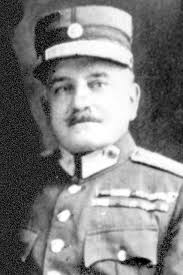 W
WDimosthenis Dialetis was a Greek soldier who rose to the rank of Lieutenant General.
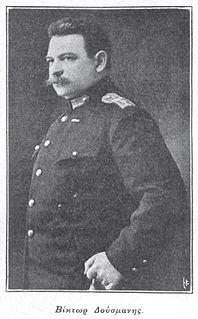 W
WViktor Dousmanis was a Greek military officer, who rose to the rank of Lieutenant General. He distinguished himself as a staff officer during the Balkan Wars and became a leading monarchist during the National Schism, serving three terms as Chief of the Hellenic Army General Staff.
 W
WAthanasios Exadaktylos was a Greek Army officer who rose to the rank of Major General and played an important role in the Macedonian Struggle and served in various high staff positions, including as Deputy Chief of the Hellenic Army General Staff.
 W
WPanagiotis Gargalidis was a Greek army general who fought in the Greco-Turkish War of 1897, the Balkan Wars, World War I, and the Asia Minor Campaign, and leader of a failed coup attempt in 1923.
 W
WBrigadier-General Giuseppe Garibaldi II, better known as Peppino Garibaldi, was an Italian soldier, patriot and revolutionary, grandson of Giuseppe Garibaldi.
 W
WRicciotti Garibaldi was an Italian soldier, the fourth son of Giuseppe Garibaldi and Anita Garibaldi.
 W
WGeorgios Hatzianestis was a Greek artillery and general staff officer who rose to the rank of lieutenant general. He is best known as the commander-in-chief of the Army of Asia Minor at the time of the Turkish August 1922 offensive, which he failed to stop. Relieved, he was later tried and condemned in the Trial of the Six as one of the main culprits of the Greek defeat in the Asia Minor Campaign, and executed.
 W
WChristos Hatzipetros was a Greek artillery officer who rose to the rank of Major General.
 W
WIoannis Hatzopoulos was a Greek army officer, who commanded the IV Army Corps in 1916 and was interned with his men in Görlitz, Germany.
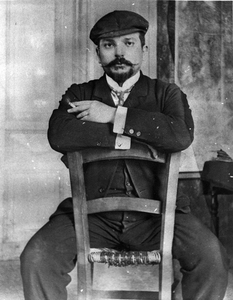 W
WGeorgios Kakoulidis was a Hellenic Navy officer, who served as Chief of the Hellenic Navy General Staff, and later became a politician.
 W
WPeriklis Kallidopoulos was a Greek Army officer who reached the rank of major general, before entering politics. During World War II, he was active in the Greek Resistance, and is honoured as a "Righteous Among the Nations" by Yad Vashem.
 W
WIoannis Kalogeras was a Greek army officer and politician.
 W
WNikostratos Kalomenopoulos was a Greek revolutionary and Army officer who reached the rank of major general. He is also known by his nome de guerre Kapetan Nidas.
 W
WMiltiadis Kanaris was a Greek admiral and politician. He was the son of Konstantinos Kanaris.
 W
WEfstathios Katsikogiannis was a Greek Army officer who reached the rank of major general.
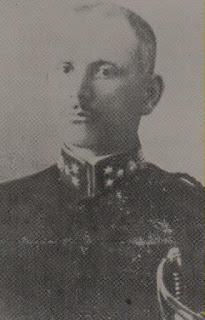 W
WNikolaos Kladas was a Greek Army officer who reached the rank of major general.
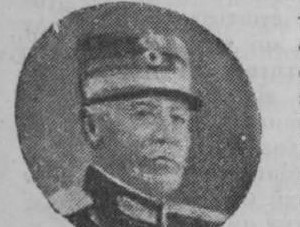 W
WKleomenis Kleomenous was a Hellenic Army officer.
 W
WKonstantinos Koumoundouros was a Greek Navy officer and politician.
 W
WDimitrios Kriezis was a Greek naval officer. He was the second son of Admiral and Greek War of Independence hero Antonios Kriezis. He served as the aide-de-camp of King George I of Greece, became Minister for Naval Affairs in the Nikolaos Deligiannis cabinet of 1895, and headed the Greek fleet's Ionian Sea squadron during the Greco-Turkish War of 1897. He retired with the rank of Rear Admiral.
 W
WGeorgios Leonardopoulos was a Greek army major general who fought in the Greco-Turkish War of 1897, the Balkan Wars, World War I, and the Greco-Turkish War of 1919–1922, and leader of a failed coup attempt in 1923.
 W
WNikolaos Makris was a Greek soldier and politician.
 W
WVasileios Melas was an officer of the Hellenic army. He was Pavlos Melas' younger brother.
 W
WZygmunt Mineyko was a Polish nobleman, army officer, scientist and engineer who later became a naturalized Greek citizen and a public figure in Greece. His son-in-law Georgios Papandreou, his grandson Andreas Papandreou and his great-grandson George Papandreou all became Prime Ministers of Greece.
 W
WKonstantinos Moschopoulos was a senior officer of the Hellenic Army who distinguished himself in the Balkan Wars of 1912–1913 and served as Chief of the Hellenic Army General Staff.
 W
WKonstantinos Pallis was a staff officer of the Hellenic Army, who served as chief of staff of the Army of Asia Minor in 1920–22, and as Chief of the Hellenic Army General Staff during the Greco-Italian War of 1940–41.
 W
WAnastasios Papoulas was a Greek general, most notable as the Greek commander-in-chief during most of the Greco-Turkish War of 1919–22. Originally a firm royalist, after 1922 he shifted towards the republican Venizelists, and was executed in 1935 for supporting a failed republican coup.
 W
WLeonidas Paraskevopoulos was a senior officer of the Hellenic Army and politician. He played a major role in Greece's war effort during World War I, and was the commander-in-chief of the Army of Asia Minor in 1919–20. In later life he was a member of the Greek Senate and served as its speaker in 1930–32.
 W
WKonstantinos Sapountzakis was a Greek Army officer. He is notable as the first head of the Hellenic Army General Staff and as the first commander of the Army of Epirus during the First Balkan War.
 W
WKonstantinos Smolenskis or Smolents was a Hellenic Army officer. Descendant of an Aromanian family that had settled in the Habsburg Monarchy and returned to Greece after the Greek War of Independence, early in his career he was distinguished as a well-educated and capable officer. He particularly distinguished himself in the Greco-Turkish War of 1897, where he led the Greek defenders at the Battle of Velestino. This rendered him a national hero and earned him widespread popularity; he was twice elected Member of the Hellenic Parliament, and served twice as Minister for Military Affairs.
 W
WNapoleon Sotilis was a Hellenic Army officer who reached the rank of Lieutenant General.
 W
WXenophon Stratigos was a senior staff officer of the Hellenic Army who played a major role in the Balkan Wars of 1912–13 and the Asia Minor Campaign in 1921–22, serving also as de facto Chief of the Hellenic Army General Staff in 1916–17 and in 1921. He retired from the army in September 1921 and served as Minister for Transport in 1922. Condemned to life imprisonment at the Trial of the Six, he was later pardoned and left for Switzerland, where he lived until his death.
 W
WNikolaos Trikoupis was a Greek general and politician, most notable for his service in the Greco-Turkish War of 1919–1922, where he was taken as a prisoner of war. He also participated in the 1896 Summer Olympics, where he came third in the military rifle.
 W
WVlasios Tsirogiannis was a Hellenic Army officer who rose to the rank of Lieutenant General.
 W
WChristos Tsolakopoulos was a Hellenic Army officer. Tsolakopoulos was born on 1 January 1868 in Nafplio. He enlisted in the Hellenic Army as a volunteer on 15 August 1886. While a student at the NCO School, he participated in the Greco-Turkish War of 1897. On 9 August 1899 he graduated from the NCO School as an Infantry 2nd Lieutenant. In 1905, during the early stages of the Macedonian Struggle, he led an armed band in the area of Morihovo with the nom de guerre of Kapetan Rembelos.
 W
WGeorgios Tsontos (1871-1942) also known with the nom de guerre Kapetan Vardas, was a Greek guerrilla fighter, general, and later politician from Crete.
 W
WKonstantinos Typaldos-Alfonsatos was a Greek Navy officer. He served briefly as Minister for Naval Affairs (1922), Chief of the Hellenic Navy General Staff (1927), and Inspector General of the Navy (1929–31), retiring with the rank of vice admiral.
 W
WTimoleon Vassos or Vasos was a Hellenic Army officer and general. He was born in Athens in 1836, the younger son of the hero of the Greek Revolution Vasos Mavrovouniotis. He studied at the Hellenic Military Academy and continued his studies in France before being appointed as aide de camp to King George I. In February 1897, as a colonel, he was sent at the head of an expeditionary force to Crete to assist the local Cretan revolt against the Ottoman Empire, an act which precipitated the outbreak of the Greco-Turkish War of 1897. He eventually reached the rank of Major General and garrison commander of Athens.
 W
WIoannis Velissariou was a Hellenic Army officer and hero of the Balkan Wars. He is considered to be one of the most important figures in the military history of modern Greece. He had a decisive role in the Battle of Bizani during the First Balkan War (1912–1913), forcing the Ottoman Army to surrender unconditionally.
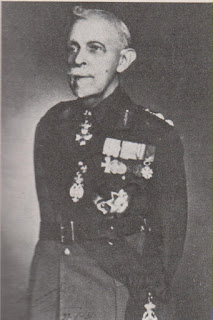 W
WAristotelis Vlachopoulos was a Hellenic Army officer who rose to the rank of Lieutenant General and served as Chief of the Hellenic Army General Staff in 1920–21.
 W
WNikolaos Zorbas, was a Greek soldier, most notable as the nominal leader of the Military League which organized the Goudi coup in 1909.
 W
WEmmanouil Zymvrakakis was a Hellenic Army officer who rose to the rank of Lieutenant General, and was distinguished in World War I.